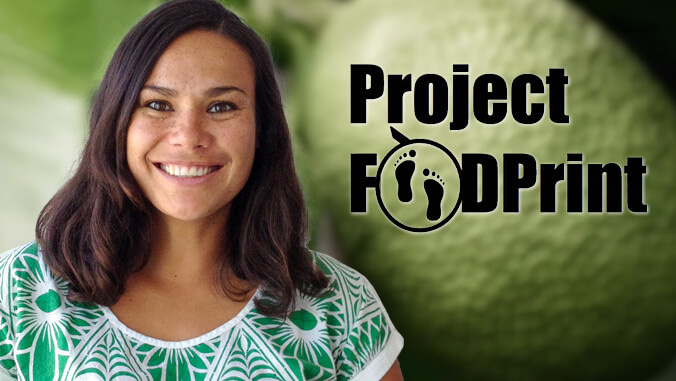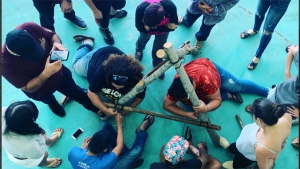
University of Hawaiʻi at Mānoa graduate student Kālisi Mausio is going full throttle this semester. Despite the added pressures thrown at her during the COVID-19 pandemic, the mother of twin toddlers continues to work toward a PhD in tropical plant and soil sciences while maintaining her 20-acre tree farm in Hilo. And her endeavors keep growing. Mausio is determined to launch a startup to offset carbon emissions from commercial airliners by planting ʻulu or breadfruit trees.

Her proposed platform, Project FOODPrint, is where passengers can calculate their flight’s carbon output to determine how many locally-farm raised trees to sponsor.
According to Mausio, a single ʻulu tree can sequester just over one ton of carbon within a 30- to 40-year lifespan. “That’s equal to about a round-trip flight from Tokyo to Honolulu,” she explained.
Her two-fold concept is the sponsored tree could also help sustain local farmers who can re-introduce the nutritious breadfruit crop Polynesians consumed for centuries back to Hawaiʻi’s markets.
“I think there’s enough interest out there for folks to invest in this sort of thing to help farmers. Especially after what we’re going through now with COVID-19 just a lot more appreciation for local food,” Mausio said.
Looking to the past to guide present and future
The UH Office of Indigenous Innovation, UH Office of Sustainability and UH Mānoa Native Hawaiian Place of Learning Advancement Office is on a mission to mentor students like Mausio who have startup ideas linked to everything from agriculture, ʻāina or land management to afforestation. She was one of ten UH students who recently completed the cohort’s inaugural (K)new Futures Challenge, an 8-week program that helps enhance projects by drawing upon Hawaiian ancestral knowledge.
“The indigenous peoples of Hawaiʻi had calibrated systems that created abundance for current and future generations,” said Kamuela Enos, UH System director of indigenous innovation which is housed within the Office of the Vice President for Research and Innovation.
Enos highlighted systems in ancient Hawaiʻi like ahupuaʻa or land division that stretched from mountain to ocean where sustainable farming and fishing thrived for hundreds of years.
Turning startup dreams into reality

In an effort to help kickstart the UH students’ projects, a grant from the Castiglione a Casauria Foundation Foundation funded cash prize awards to each participant.
Mausio earned $4,250 and is one of three students selected to move on to a 6-month incubator designed to help refine startup ideas in preparation for future investment. The Purple Prize has helped UH-originated projects in previous years, like Mauka Marketplace and Hohonu.
Plans to launch more innovative incubator opportunities at UH in fall 2020 are already underway.
As for Mausio, she’s preparing to start her journey with Purple Prize next week. The Hawaiʻi Island doctorate-seeking farmer is eager to take in guidance to help build her platform, all while honing in lessons from her kūpuna (elders). “They taught me the importance of one’s place in the world, to always consider how one’s actions impact everything else around them—that part of being and caring for community. Today, this lesson emphasizes how important it is to look to the past to guide us with principles that sustain and regenerate, especially as we navigate our ‘(k)new normal,’” she said.
—By Moanikeʻala Nabarro

